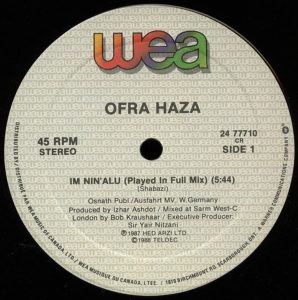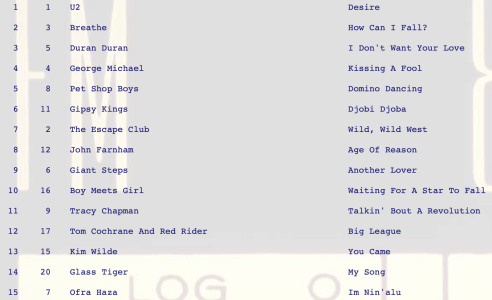#134: Im Nin’alu by Ofra Haza
City: Montreal, PQ
Radio Station: CKOI
Peak Month: December 1988
Peak Position in Montreal ~ #7
Peak position in Vancouver ~ did not chart
Peak Position on Billboard Hot 100 ~ did not chart
Peak Position on Finland Singles chart ~ #1
Peak Position on Greece Singles chart ~ #1
Peak Position on Norway Singles chart ~ #1
Peak Position on Portugal Singles chart ~ #1
Peak Position on Spain Singles chart ~ #1
Peak Position on Switzerland Singles chart ~ #1
Peak Position on West Germany Singles chart ~ #1
Peak Position on Austria Singles chart ~ #2
Peak Position on Sweden Singles chart ~ #2
YouTube: “Im Nin’Alu”
Lyrics: “Im Nin’Alu”
Ofra Haza is a singer born in Tel Aviv, Israel, in 1957. She began singing at an early age, including at local weddings and as a soloist in her school choir. At the age of 12, Haza joined a local protest theater troupe, named “Hatikva” (The Hope) which had been recently founded by a neighbor of hers, Bezalel Aloni. Haza soon emerged as one of the most gifted performers in the troupe. Aloni spotlighted her in many of his productions, and later became her manager and mentor. At 19, she was Israel’s foremost pop star, and news articles have retrospectively described her as “the Madonna of the East”. She represented Israel in the Eurovision Song Contest of 1983, with the song “Hi”, finishing second with 136 points.
Haza’s major international breakthrough came in the wake of the album Shirei Teiman (“Yemenite songs”), which she recorded in 1984. The album consisted of songs that Haza had heard in childhood, using arrangements that combined authentic Middle Eastern percussion with classical instruments.
Further recognition came with the single “Im Nin’alu”, her debut single from the 1988 album Shaday. The album won the New Music Award for Best International Album of the Year.

“Im Nin’alu” is a poem by 17th-century Rabbi Shalom Shabazi. The English translation of “Im Nin’alu” is “If the gates are locked.” The song gives praise to the Creator who “reigns supreme and is higher than the angels.” The angels “glory in His name.” The song tells how “six-winged cherubs surround Him,” and how they whirl and sing together in unison in praise to the divine.
Shalom Shabazi (1619 – c. 1720) was born in the town of Najd al-Walid. When he moved to Ta’izz, he built a house of prayer and a ritual bath (mikveh) outside the city, beneath the mountain of Jebel Sabir. He and his family were expelled, along with most of the Yemenite Jews, in 1679. Shabazi, like many Jews of his generation, was influenced by Shabbetai Zevi and thought that he may be the messiah. Shabazi was buried in Ta’izz, at the foot of Jamal Sabir. In the early 20th century, the grave of Shabazi was a place of pilgrimage for both Jews and Muslims, especially for those who sought healing. More recently, streets have been named after him in both Jerusalem and Tel Aviv.
“Im Nin’alu” peaked at #4 in Lynn (MA), #7 in Montreal, and also charted in San Francisco. Internationally, “Im Nin’alu” topped the pop charts in Finland, Greece, Norway, Portugal, Spain, Switzerland and West Germany. It reached #2 in Austria, Israel, and Sweden, #6 in Denmark and France, and #15 in the UK.
In the aftermath of her success with “Im Nin’alu”, in 1989, Haza released Desert Wind which was more oriented toward the international market. She sang songs in English, but also Hebrew, Arabic and Aramaic.
In 1992, her studio album Kirya received a Grammy nomination for Best World Music Album. On the album she sang a duet with Iggy Pop.
In 1994, Haza released her first Hebrew album in seven years, Kol Haneshama (“The Whole Soul”). Though not an initial chart success, the album produced one of her biggest hits to date, Le’orech Hayam (“Along The Sea”), written by Ayala Asherov. The song did not have any substantial chart success upon its release to radio but became an anthem after Haza performed it on the assembly in memorial to deceased Prime Minister Yitzhak Rabin, a week after he was assassinated in November 1995.
In 1997, she released her last studio album Ofra Haza. In 1998, she released a live album At Montreux Jazz Festival. Haza was cast in a key role in the 1998 animated musical The Prince of Egypt. In 2000, Ofra Haza died at the age of 42 due to complications from AIDS.
In 2023 Rolling Stone magazine ranked her at 186 on their list of the 200 Best Singers of All Time. The magazine wrote “Like a call to prayer, the opening phrase of Ofra Haza’s 1984 song “Im Nin’alu” is instantly transportive, sweeping the listener up in her expressive, fluttery mezzo-soprano. And when U.K. production duo Coldcut sampled that passage on their landmark 1987 remix of Eric B. & Rakim’s “Paid in Full,” it was a cross-cultural masterstroke that helped bring the Israeli singer’s unmistakable voice to the pop mainstream. Inspired by her Yemeni-Jewish ancestry, Haza combined traditional vocal conventions with modern technique to create something that felt at once ancient and ahead of its time. On albums like 1984’s Shirei Teiman, 1988’s Shaday, and 1992’s Kirya, her unprecedented splash in the U.S. pop market cemented her status as “The Madonna of the Middle East.”
April 16, 2025
Ray McGinnis
References:
“Singer Ofra Haza Dies,” BBC, February 24, 2000.
Itamar Eichner, “Rabbi Shabazi’s bones to be buried in Israel?,” Jewish World, January 21, 2008.
David Brinn and Hannah Brown,“Ofra Haza named one of top 200 singers of all time by Rolling Stone,” Jerusalem Post, January 2, 2023.
“The 200 Greatest Singers Of All Time: From Sinatra to SZA, from R&B to salsa to alt-rock,” Rolling Stone, January 1, 2023.

CKOI 96.9-FM Montreal (PQ) Top 15 | December 2, 1988

Leave a Reply